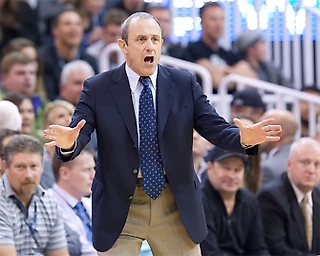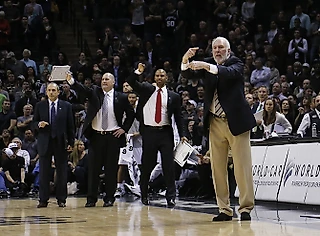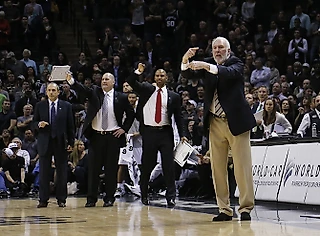Tough month
It was a busy month. First, we played Gomelsky tournament and the tournament in Saint-Petersburg. Then, we had a chance to meet our fans here and left for the States.
At the beginning the biggest thing about the trip was the joy to go overseas to face NBA franchises on their court. But soon we realized that we need to learn how to handle ourselves during such a long trip. Some of our players had problems with sleeping, recovery of energy and so on. Before the trip I thought that the NBA rules will be a factor, but it turned out that the major factor in the first game was the physical strength of Orlando, which is a much more physical team than Toronto. By the way, Maurizio Gherardini told me that last season they lost their first game of the series against Orlando the same way we did: they were down 20 points by the end of the first quarter and never came back in the game, being completely blown out by Dwight Howard.
The players that impressed me the most were Dwight Howard (he looked like Godzilla against us) and Hedo Turkoglu. I haven’t seen Hedo for a long time and I was very surprised to find out, when he came up to say hello before the beginning of our game and gave me a hug, that he became extremely big and strong — wide shoulders, wide chest. He plays at a great level, with great confidence and great quickness. During the first possession he drove Siskauskas to the basket as if he was playing against a young kid. And Siskauskas is not only a strong player here in Europe, but is also a fast player. I was extremely impressed by Hedo. I think the title of the Most Improved Player he received last season gave him a lot of confidence.
Another thing that affected our game, beside physical style imposed by Orlando, was the length of the game. 48 minutes is a lot not only for the players, but for the coach as he has to imagine completely different rotation from the one he is used to. For instance, when we played against Toronto we were tired after 36 minutes. In Europe, we’d only have the last 4 minutes to play, but here we started a completely new quarter and it was very difficult for us to find energy especially after the injury of Smodis.
I also noticed during this trip that Toronto and Orlando were living this experience in a different way. In Toronto, where the franchise is run by two people who are extremely open to the rest of the world — Brian Colangelo and Maurizio Gherardini, — our clubs interacted and we had the opportunity to exchange opinions. I was very happy to be invited to give a basketball clinic to coaches there. It was not only an opportunity to say something about the system we have in CSKA, but also an opportunity to meet local coaches. It was similar to NBA teams coming to Europe. It was a big event not only on the court, but off the court, an opportunity to exchange knowledge between two different basketball worlds.
I opened our practices to coaches. I always do. I think it’s very important. I don’t open our practices to journalists, because sometimes something not-so-good can happen during the practice. Some players might play bad, some players might start arguing under the pressure. Like in all families little things might happen. The journalist is doing his job in every moment. This could lead to misunderstandings that can be harmful to the team. By the way, you don’t invite critics to evaluate the performance of an orchestra to the general rehearsal. Come see us when we are on stage. When we are on stage, it’s part of our job to be evaluated.
In Orlando, we were treated really well, but we never had a chance to meet anybody representing the team or the club before or after the game. This isn’t a complaint. I’m just pointing out a different approach: it was just another exhibition game for them. They had prepared extremely well because I was very impressed by how thoroughly they scouted us. All our offensive systems were very well defended. Obviously, we liked more the possibility to interchange off the court as well, but I respect Orlando’s approach too.
It was of help to us to spend so much time together. Most of our players brought their wives or girlfriends, American players had their families visiting them in Toronto and Orlando. In Toronto we also had Russian fans coming to the game, because there is a big Russian community there — some 250 000 Russians who live in Toronto. Also we will remember this trip for visiting the Niagara Fall and meeting Mickey Mouse.
The worst part of the trip was the injury of Matjaz Smodis. This is a big problem. Over the last few years, Matjaz has had a number of injuries and we hope that this year we’ll be able one more time to help him to recover.
The second major problem was sleeping deficiency. Almost everybody on the team experienced it after the trip. I was finding myself up in the middle of the night for two-three hours. This is why we had a light practice after 11 hours of flight instead of going home. My players were not happy and were mumbling: “What the hell is he doing”. I respect that, but sometimes you should rather listen to your inner voice. The reason was that I wanted them to get sweat, have a little work-out instead of going immediately home and falling asleep. I thought this might mess up with their sleep even more and that reactivating their muscles after a long trip and getting tired will help them in several ways. As a matter of fact, it worked very little, because they could not sleep that night and the night after.
This is why the game with Ural Great was not easy. It took us 20 minutes to find our rhythm. We had a very good second half when we played good defense and smooth offense. And we had a great contribution from our young players — Keyru, Kaun and Shved. This enabled me to give enough rest to our veterans.
We prepared very well for Milano game. They are one of the best team defensively in the Italian league. Obviously, they are trying to find their chemistry in offense, having a new coach and more than 6 new players. I can honestly admit that at the moment I didn’t feel that we had such a good game in our pocket. Our players were focused, it was a good atmosphere in Gomelsky Hall, and it was very nice that players like Morris stepped up and played probably their best game so far.
Then we had a very difficult game and an important win in Saint-Petersburg. I don’t know why, but all my four seasons with CSKA my teams never played well in Saint-Petersburg. We always have tough games there regardless the level of our opponent. I remember that we even lost both games in Saint-Petersburg during my first year with CSKA — to both Spartak and Dynamo. This time the arena was very cold again and it was difficult to play. Plus Zhenia Pashutin is doing a very good job (I’m really sorry they were eliminated from the European Cup) as he had a very good selection of players, he drafted a very smart point guard like Andrew Wisnewski. They play a very good basketball: they have size, they have a great director of the orchestra and they play together. It was not an easy win for us. I was pleased with the result, because we had a very hard time to attack them in the first half.
So, once again, it was a tough month for us. Going through this kind of experience helped us a lot to melt together, to become a team. It was interesting that the player who stepped up the most was the player who was the most questioned during the last three weeks — Terence Morris. Terence had a hard time to understand our system, our way of living basketball, not only playing basketball, our way of showing our emotions, of reacting to situations emotionally. This is the way we are. This is the way we live basketball in CSKA. Terence is a quiet person, very reserved and soft-spoken. I hope that after these two good games he will be able to contribute the same way on a regular basis.
Last year at that moment we were in a situation where we knew much less about ourselves, compared to what we know now — both good and bad. I always believed that during the first months it’s really important to know as many bad things about yourselves (as a team, people, relationships) as you can. The more you know, the more you can do to solve the problems. So if there is a problem or there might be a problem, you need to find it out as soon as possible. Last year we didn’t find out some problems by this time. Now we are a little bit ahead from this point of view.
This year Euroleague is a much tougher competition, because we have groups of six teams. This means that every game is even more important. We’ve got to be ready for everything.
And one more thing about our overseas trip. When I was talking to US and Canadian journalists, I was surprised to see how many stereotypes about European coaches and basketball they still carry. One journalist told me that European coaches are very severe, yell a lot and make a lot of practices. I asked him: “Have you ever seen a practice in Europe?” “No,” he said, but he heard it was like that. I simply suggested that he takes a look at the schedule of Euroleague teams. Because of the schedule we have, we almost never go two practices a day. For example, in CSKA we have two practices only on Monday, after a day off. Other days, it’s either a day before the game or after the game, we have only one practice. We don’t want it to be an overkill for our players, we simply want them to play good basketball.
Due to the fact that we take part in 3 competitions, every single game is important. You cannot afford to lose several games in a row, as it will affect your standings dramatically in each competition. They looked at me as if I was telling them something extremely strange. I explained that we need to emphasize the fundamentals of the game, because without the athleticism they have in the NBA, most of the situations can be solved only thanks to good attention to the angles, to the passing, to the timing, to the execution. We have to adjust our game, because the personnel we have is different.
Unfortunately, there is still a lot of misinformation about the way we approach game in Europe. Even the great result the US national team had in Beijing (after so many years of disgrace) thanks to admitting the strengths of their opponents and adjusting their game accordingly wasn’t enough to change the stereotypes. It’s funny that they still need some Christopher Columbus to come the opposite way and discover European basketball.





Congratulations. I liked the toughness of your team, the game control you had and your team’s nice 1 on 1 defense all along the game. Also the use you’re making of 1 on 1 ofensive situations, I think that not many teams use those situations the way you do. I read what you think about pick and roll situations (every team have their defense ready for pick and roll) and I suppose that pure 1 on 1 is one of the answers you give to avoid playing too much P&R.
I’d like to ask you about Holden. It has been an interesting surprise to see him seated on your right on the bench. I have never seen an injured player at that level doing that assistant coach job. I think that shows your confidence in the player and also the player’s desire to help his team.
Again, thank you, it’s a pleasure to watch your teams.